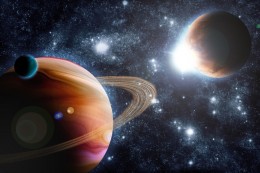Do you think there could be life on any of the 7 new planets NASA discovered?
Do you think there could be life on any of the 7 new planets NASA discovered?
What do you imagine that life form would/could look like?
It's very possible but we'll never know for sure in our lifetime.
It was reported these planets are (40) light years away.
One light year is almost (6 Trillion) miles X 40 = 240 trillion miles!
Therefore it would not surprise me if there are planets in other galaxies that are very similar to earth including it's nature and the beings that inhabit those planets.
Some people believe (we) may have abandoned a dying planet and resettled on earth ourselves. This is how they explain the building of such things as the pyramids without heavy machinery.
It would be such a waste of the creation of the universe if Earth is the (only planet) with sustainable life on it.
I believe everything came into existence for a reason.I was reading an article yesterday that they hoped they'd be able to establish whether there's life on those planets within the next 10 years or so. So, depending on how old you are/how long you plan to live, you could definitely know!
I've never heard of the theory that humans may be from a dying planet ourselves who settled on earth. Interesting.
DS, The Universe has no intelligent design. If it did there wouldn't be need for the other planets in our solar system An intelligent design wouldn't even need the Sun. Also, we can't get along with our own species, how would we with other lifeforms?
I personally have always said that there has to be life out there somewhere. It could just be plants of some kind, but there are way too many planets and solar systems out there for this to be the only one to have life.
And for us to think we are the only life form is rather self-centered (can't really think of the right word) in a way... meaning who's to say that life has to be just in a human form like us.
If there is life it is most likely less advanced then ourselves. I Question the theories about the once inhabited planet Mars. There doesn't seem to be anything resembling a modern advanced society. Where are the satellites and infrastructures. There should be some evidence of it, rather than maybe.
I guess the broader question would be are they inhabitable by us?I think that planets with the potential to harbor life are the exception rather than the rule. Finding planets with Earth like mass, and in a temperate zone ideal for life as we know it does not take into accounts the variable without number that must coincide for there to be life at all. After all, not so much as a microbe has been found in our Solar System outside Earth.
Single celled life evolved several different ways with multiple biochemistries on Earth, including methane consuming, sulfide-vent residing and the standard carbon dioxide reducing and oxygen producing life forms.
Given all these types of simple single celled life, only once in Earth's entire history and almost a billion years after life evolved did more complex eukaryotic cells arise with a separate nucleus and organelles (mitrochondria). That is what enabled more complex multi-celled organisms to arise. And it hasn't happened again on Earth, despite all the cell lineages literally floating around. This may be the "great filter" that rarely happens.
If that is true, single celled life may be common in the universe whether around under-sea geysers on Europa or bacteria on alien worlds - but nothing more advanced is likely there.
Related Discussions
- 16
Is it really that odd to think we are not the most advanced species out there?
by Slimabid 13 years ago
Is it really that odd to think we are not the most advanced species out there?
- 14
Is there life on other planets? What do you think?
by DaniellaWood 14 years ago
Is there life on other planets? What do you think?Scientific descoveries suggest that some planets are too hot or too cold for life and that others have no water and so on. But surely humans and animals canNOT be the only living creatures in the whole of the solar system...some even claim to...
- 38
Is Their Life on Other Planets?
by lesliebyars 12 years ago
Many scientists believe their is life on other planets. Not on Mars or Venus but in the next Solar System. What do you think and should NASA take this issue seriously?
- 30
Do you believe that there is life on other planets besides Earth and what makes
by Rodric Anthony Johnson 13 years ago
Do you believe that there is life on other planets besides Earth and what makes you think so.There are so many schools of thought (religious and secular) about life on earth and other planets. Are we alone in the universe or did life sprang into being elsewhere? Did God only have enough time for...
- 33
Are we alone in the Universe?
by alec50 13 years ago
I have always been fascinated with astrology and all the planets in our solar system, but in theory the planet Earth is just a needle in haystack.. There is so much explore, I believe we're not the only ones living on a planet. We need to explore outside our solar system to get proper answers but...
- 11
Why have we found no life on other planets?
by Daffy Duck 14 years ago
There are millions of other worlds in countless star systems in thousands of galaxies yet we have found no life yet....Why? Is it because there is no other life in the universe? Is it because there use to be thousands and millions of years ago, but no longer? Is it because there...












